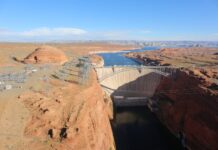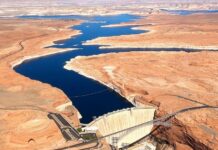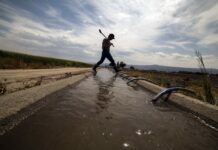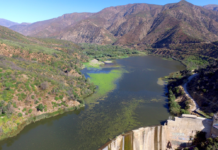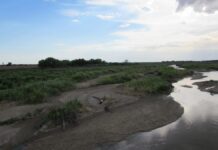Electric costs in Colorado set to surge as Lake Powell struggles to produce hydropower
A federal agency aims to offset rising costs linked to Lake Powell’s inability to produce as much hydropower due to drought.
As the Colorado River shrinks, can the basin find an equitable solution in sharing...
Drought and climate change are raising concerns that a century-old compact that divided the river’s waters could force unwelcome cuts in use for the upper watershed.
Lawmakers suspend attempt at legislative fix for water speculation
Colorado lawmakers have suspended an attempt to prohibit outside investors from profiting off the state’s water.
Emergency Colorado River rescue plan likely to include more Flaming Gorge releases, payments to...
Colorado, New Mexico, Utah and Wyoming may face requests for voluntary cutbacks in their use of Colorado River water next year.
Farms use 80% of the West’s water. Some in Colorado use less, a lot...
A greenhouse in Colorado is using 95 percent less water to grow food compared to traditional agricultural practices.
The fun is back at Blue Mesa and other reservoirs, as heavy winter snows...
Southwestern Colorado’s Blue Mesa Reservoir, drained by years of drought and a major release of water designed to aid a plummeting Lake Powell, is experiencing a rebirth this summer.
Wyoming’s Colorado River water rights in jeopardy without improved info, official warns
Wyoming’s water chief wants emergency funds for hydrologists to measure flows in the state’s portion of the troubled Colorado River Basin, documentation he said is vital to preserving irrigation...
The dam nobody wants just won’t go away
Dams can stop the natural flow of sand and silt to the sea—resulting in coastal wetland loss and disappearing beaches—as well as preventing fish from reaching vital spawning grounds.
Can carbon credits save Sacramento-San Joaquin Delta islands and protect California’s vital water hub?
An ambitious plan would use carbon credits as incentives to convert Delta islands to wetlands or rice to halt subsidence and potentially raise island elevations.
Colorado AG, top water quality regulator vow to challenge new Clean Water Act rule
Though many agricultural interests and water utilities support the new Waters of the U.S. (WOTUS) rule, as it is known, Colorado Attorney General Phil Weiser and Patrick Pfaltzgraff, director of the state’s Water Quality Control Division, said they will take legal action to protect streams that are no longer subject to federal oversight.



